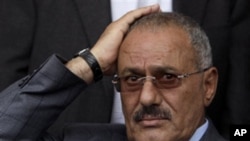While the political and security situation in Yemen spirals into uncertainty, U.S.-based pressure groups and analysts are pressing the U.S. government for more helpful action.
Amitabh Pal is one of many U.S.-based analysts disappointed that the U.S. government has not been more effective in helping move Yemen toward a peaceful, democratic solution.
Pal recently wrote a book about nonviolent movements in the Muslim world called Islam Means Peace. "The reason is that the Obama administration like every other U.S. administration has to balance its strategic and geopolitical interests with its concerns over human rights and democracy. So it is trying to play on two fronts at once and the result is this very muddled, very inconsistent approach," he said.
Pal says the Yemen situation is potentially the most difficult and dangerous of all the so-called "Arab spring" protest movements to deal with. "There are arms afloat in Yemen to a very large extent much larger than in other Arab countries and there has been a presence of al-Qaida in Yemen again much larger than in pretty much any other Arab country, and I knew that it would probably devolve and degenerate soon and I am surprised in some sense that it took this long," he said.
Faris Almatrahi, a human rights activist with the Yemeni Youth Abroad for Change group, says the United States, for years, picked the wrong security ally in three-decade President Ali Abdullah Saleh. He has refused to step down, despite the mounting non-violent youth driven protests and Friday's rocket attack on the presidential compound which injured him.
"The president of Yemen due to his lack of leadership and the situation that he has placed Yemen in is providing the ideal recruiting environment for extremism in Yemen. You have these recruiting mechanisms that take all that poverty and environment and situation and directs it to the Yemeni government and links it to the United States and builds up that hatred toward the Yemeni government and toward the United States for allying itself with such a corrupt government," he said.
Almatrahi is also calling for U.S. sanctions against Yemen's government.
A former U.S. ambassador to Yemen, Edmund J. Hull, has also appealed for targeted sanctions, as well as forceful demands for President Saleh's immediate resignation, and the endorsement of early elections.
Aliya Naim, a co-director for a group called Yemen Peace Project, says the situation is getting very alarming, and she fears military defectors could soon join tribal clans in escalating armed pressure against the ailing president.
"One thing that we have not seen that could potentially make the situation a lot worse if it happened concerns Ali Mohsen, who is the leader of the part of the army that defected back in March after the first massacre of protesters. We have not seen them getting involved on a full-blown scale in the conflict. I believe it is 40 percent of the army that Ali Mohsen controls. If he got fully involved in this military conflict that would just really throw Yemen into civil war, with no going back," she said.
Her group is trying to raise medical funds to help injured protesters in Yemen.
It is also organizing a letter writing campaign to elected U.S representatives to put more pressure on the U.S. government.
For his part, President Barack Obama sent counter-terrorism advisor John Brennan to discuss the Yemen situation with officials in Saudi Arabia and the United Arab Emirates this week. On Friday the White House called for restraint, a peaceful transfer of power, and an end to what it called "senseless" violence in Yemen.




